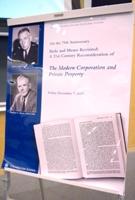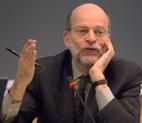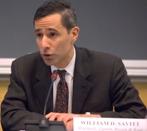Berle & Means' The Modern Corporation Relevant 75 Years Later
(Left to right) Professor John Coffee; Prof. Curtis Milhaupt '89; Charles Niemeier, member of the Public Company Accounting Oversight Board; and Prof. Eilis Ferran,
Columbia Law professor John Coffee focused primarily on the corporation as it is today, arguing that the United States is not losing its competitive edge in attracting global capital. Its “high enforcement intensity” regulatory regime attracts quality companies and results in a much lower cost of capital for corporations listing in U.S. markets.
|
|
|
|
Professor Mark Roe |
William Savitt '97, partner, Wachtell Lipton Rosen & Katz |
Harvard University Law professor Lucian Bebchuk suggested what ought to be. Following up on his controversial Virginia Law Review article (Volume 93, No. 3, May 2007, p. 676), in which he advocated sweeping reforms in corporate election rules designed to again render directors “truly accountable to shareholders,” Bebchuk defended his views against critics, including those of Martin Lipton, a well-respected critic of shareholder activism. In his presentation, Bebchuk called for “private ordering,” a process whereby corporations change their stockholder election rules themselves rather than being legally forced to reform. Commentator William Savitt ’97 of Wachtell Lipton Rosen & Katz complained that Bebchuk has never explained why, in Savitt’s words, “management by marionette,” in which stockholders hold the balance of power, is preferable to the status quo.
Professors Ronald Gilson of Columbia Law School and Charles Whitehead ’86 of Boston University Law School argued that the private equity wave is fueled by more than low interest rates. Advances in risk management, the creation of private share markets, and Sarbanes-Oxley have increased the costs of going public while decreasing the costs of going (or remaining) private. University of Iowa law professor Hillary Sale demurred, noting that private equity relies on public markets for information. Frank Partnoy of the University of San Diego Law School also took issue, arguing that Knightian uncertainty -- risk that cannot be known, hedged, or diversified -- is still potent so risk-bearing shareholders remain necessary.



